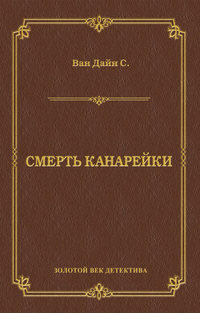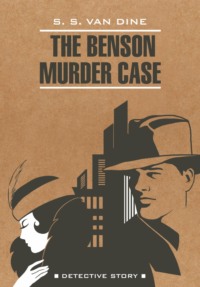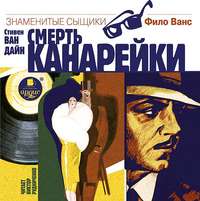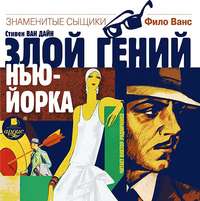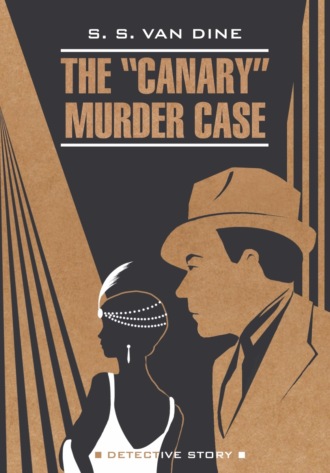
Полная версия
The «Canary» Murder Case / Смерть Канарейки. Книга для чтения на английском языке
“Never mind whether it was important or not.” Markham’s tone was cold and peremptory. “What time did he call?”
“About half past nine.”
“And who was he?”
“A young fella I’ve seen come here several times to see Miss Odell. I don’t know his name.”
“Tell me exactly what took place,” pursued Markham.
Again Spively swallowed hard and wetted his lips.
“It was like this,” he began, with effort. “The fella came in and started walking down the hall, and I said to him: ‘Miss Odell isn’t in.’ But he kept on going, and said: ‘Oh, well, I’ll ring the bell anyway to make sure.’ A telephone call came through just then, and I let him go on. He rang the bell and knocked on the door, but of course there wasn’t any answer; and pretty soon he came on back and said: ‘I guess you were right.’ Then he tossed me half a dollar, and went out.”
“You actually saw him go out?” There was a note of disappointment in Markham’s voice.
“Sure, I saw him go out. He stopped just inside the front door and lit a cigarette. Then he opened the door and turned toward Broadway.”
“‘One by one the rosy petals fall,’” came Vance’s indolent voice. “A most amusin’ situation!”
Markham was loath to relinquish his hope in the criminal possibilities of this one caller who had come and gone at half past nine.
“What was this man like?” he asked. “Can you describe him?”
Spively sat up straight, and when he answered, it was with an enthusiasm that showed he had taken special note of the visitor.
“He was good-looking, not so old—maybe thirty. And he had on a full-dress suit and patent-leather pumps, and a pleated silk shirt—”
“What, what?” demanded Vance, in simulated unbelief, leaning over the back of the davenport. “A silk shirt with evening dress! Most extr’ordin’ry!”
“Oh, a lot of the best dressers are wearing them,” Spively explained, with condescending pride. “It’s all the fashion for dancing.”
“You don’t say—really!” Vance appeared dumb-founded. “I must look into this. … And, by the bye, when this Beau Brummel of the silk shirt paused by the front door, did he take his cigarette from a long flat silver case carried in his lower waistcoat pocket?”
The youth looked at Vance in admiring astonishment.
“How did you know?” he exclaimed.
“Simple deduction,” Vance explained, resuming his recumbent posture. “Large metal cigarette-cases carried in the waistcoat pocket somehow go with silk shirts for evening wear.”
Markham, clearly annoyed at the interruption, cut in sharply with a demand for the operator to proceed with his description.
“He wore his hair smoothed down,” Spively continued, “and you could see it was kind of long; but it was cut in the latest style. And he had a small waxed moustache; and there was a big carnation in the lapel of his coat, and he had on chamois gloves. …”
“My word!” murmured Vance. “A gigolo!”
Markham, with the incubus of the night clubs riding him heavily, frowned and took a deep breath. Vance’s observation evidently had launched him on an unpleasant train of thought.
“Was this man short or tall?” he asked next.
“He wasn’t so tall—about my height,” Spively explained. “And he was sort of thin.”
There was an easily recognizable undercurrent of admiration in his tone, and I felt that this youthful telephone operator had seen in Miss Odell’s caller a certain physical and sartorial ideal. This palpable admiration, coupled with the somewhat outré[34] clothes affected by the youth, permitted us to read between the lines of his remarks a fairly accurate description of the man who had unsuccessfully rung the dead girl’s bell at half past nine the night before.
When Spively had been dismissed, Markham rose and strode about the room, his head enveloped in a cloud of cigar smoke, while Heath sat stolidly watching him, his brows knit.
Vance stood up and stretched himself.
“The absorbin’ problem, it would seem, remains in statu quo[35],” he remarked airily. “How, oh how, did the fair Margaret’s executioner get in?”
“You know, Mr. Markham,” rumbled Heath sententiously, “I’ve been thinking that the fellow may have come here earlier in the afternoon—say, before that side door was locked. Odell herself may have let him in and hidden him when the other man came to take her to dinner.”
“It looks that way,” Markham admitted. “Bring the maid in here again, and we’ll see what we can find out.”
When the woman had been brought in, Markham questioned her as to her actions during the afternoon, and learned that she had gone out at about four to do some shopping, and had returned about half past five.
“Did Miss Odell have any visitor with her when you got back?”
“No, sir,” was the prompt answer. “She was alone.”
“Did she mention that any one had called?”
“No, sir.”
“Now,” continued Markham, “could any one have been hidden in this apartment when you went home at seven?”
The maid was frankly astonished, and even a little horrified.
“Where could any one hide?” she asked, looking round the apartment.
“There are several possible places,” Markham suggested: “in the bathroom, in one of the clothes-closets, under the bed, behind the window draperies. …”
The woman shook her head decisively. “No one could have been hidden,” she declared. “I was in the bathroom half a dozen times, and I got Miss Odell’s gown out of the clothes-closet in the bedroom. As soon as it began to get dark I drew all the window-shades myself. And as for the bed, it’s built almost down to the floor; no one could squeeze under it.” (I glanced closely at the bed, and realized that this statement was quite true.)
“What about the clothes-closet in this room?” Markham put the question hopefully, but again the maid shook her head.
“Nobody was in there. That’s where I keep my own hat and coat, and I took them out myself when I was getting ready to go. I even put away one of Miss Odell’s old dresses in that closet before I left.”
“And you are absolutely certain,” reiterated Markham, “that no one could have been hidden anywhere in these rooms at the time you went home?”
“Absolutely, sir.”
“Do you happen to remember if the key of this clothes-closet was on the inside or the outside of the lock when you opened the door to get your hat?”
The woman paused, and looked thoughtfully at the closet door.
“It was on the outside, where it always was,” she announced, after several moments’ reflection. “I remember because it caught in the chiffon of the old dress I put away.”
Markham frowned and then resumed his questioning.
“You say you don’t know the name of Miss Odell’s dinner companion last night. Can you tell us the names of any men she was in the habit of going out with?”
“Miss Odell never mentioned any names to me,” the woman said. “She was very careful about it, too—secretive, you might say. You see, I’m only here in the daytime, and the gentlemen she knew generally came in the evening.”
“And you never heard her speak of any one of whom she was frightened—any one she had reason to fear?”
“No, sir—although there was one man she was trying to get rid of. He was a bad character—I wouldn’t have trusted him anywhere—and I told Miss Odell she’d better look out for him. But she’d known him a long time, I guess, and had been pretty soft on him once.”
“How do you happen to know this?”
“One day, about a week ago,” the maid explained, “I came in after lunch, and he was with her in the other room. They didn’t hear me, because the portières were drawn. He was demanding money, and when she tried to put him off, he began threatening her. And she said something that showed she’d given him money before. I made a noise, and then they stopped arguing; and pretty soon he went out.”
“What did this man look like?” Markham’s interest was reviving.
“He was kind of thin—not very tall—and I’d say he was around thirty. He had a hard face—good-looking, some would say—and pale blue eyes that gave you the shivers. He always wore his hair greased back, and he had a little yellow moustache pointed at the ends.”
“Ah!” said Vance. “Our gigolo!”
“Has this man been here since?” asked Markham.
“I don’t know, sir—not when I was here.”
“That will be all,” said Markham; and the woman went out.
“She didn’t help us much,” complained Heath.
“What!” exclaimed Vance. “I think she did remarkably well. She cleared up several moot points.”
“And just what portions of her information do you consider particularly illuminating?” asked Markham, with ill-concealed annoyance.
“We now know, do we not,” rejoined Vance serenely, “that no one was lying perdu[36] in here when the bonne[37] departed yesterevening.”
“Instead of that fact being helpful,” retorted Markham, “I’d say it added materially to the complications of the situation.”
“It would appear that way, wouldn’t it, now? But, then—who knows?—it may prove to be your brightest and most comfortin’ clue. … Furthermore, we learned that some one evidently locked himself in that clothes-press, as witness the shifting of the key, and that, moreover, this occultation did not occur until the abigail had gone, or, let us say, after seven o’clock.”
“Sure,” said Heath with sour facetiousness; “when the side door was bolted and an operator was sitting in the front hall, who swears nobody came in that way.”
“It is a bit mystifyin’,” Vance conceded sadly.
“Mystifying? It’s impossible!” grumbled Markham.
Heath, who was now staring with meditative pugnacity into the closet, shook his head helplessly.
“What I don’t understand,” he ruminated, “is why, if the fellow was hiding in the closet, he didn’t ransack it when he came out, like he did all the rest of the apartment.”
“Sergeant,” said Vance, “you’ve put your finger on the crux of the matter. … Y’ know, the neat, undisturbed aspect of that closet rather suggests that the crude person who rifled these charming rooms omitted to give it his attention because it was locked on the inside and he couldn’t open it.”
“Come, come!” protested Markham. “That theory implies that there were two unknown persons in here last night.”
Vance sighed. “Harrow and alas! I know it. And we can’t introduce even one into this apartment logically. … Distressin’, ain’t it?”
Heath sought consolation in a new line of thought.
“Anyway,” he submitted, “we know that the fancy fellow with the patent-leather pumps who called here last night at half past nine was probably Odell’s lover, and was grafting on her.”
“And in just what recondite way does that obvious fact help to roll the clouds away?” asked Vance. “Nearly every modern Delilah has an avaricious amoroso[38]. It would be rather singular if there wasn’t such a chap in the offing, what?”
“That’s all right, too,” returned Heath. “But I’ll tell you something, Mr. Vance, that maybe you don’t know. The men that these girls lose their heads over are generally crooks of some kind—professional criminals, you understand. That’s why, knowing that this job was the work of a professional, it don’t leave me cold, as you might say, to learn that this fellow who was threatening Odell and grafting on her was the same one who was prowling round here last night. … And I’ll say this, too: the description of him sounds a whole lot like the kind of high-class burglars that hang out at these swell all-night cafés.”
“You’re convinced, then,” asked Vance mildly, “that this job, as you call it, was done by a professional criminal?”
Heath was almost contemptuous in his reply. “Didn’t the guy wear gloves, and use a jimmy? It was a yeggman’s job, all right.”
Chapter VIII. The Invisible Murderer
(Tuesday, September 11; 11.45 a.m.)Markham went to the window and stood, his hands behind him, looking down into the little paved rear yard. After several minutes he turned slowly.
“The situation, as I see it,” he said, “boils down to this:—The Odell girl has an engagement for dinner and the theatre with a man of some distinction. He calls for her a little after seven, and they go out together. At eleven o’clock they return. He goes with her into her apartment and remains half an hour. He leaves at half past eleven and asks the phone operator to call him a taxi. While he is waiting the girl screams and calls for help, and, in response to his inquiries, she tells him nothing is wrong and bids him go away. The taxi arrives, and he departs in it. Ten minutes later some one telephones her, and a man answers from her apartment. This morning she is found murdered, and the apartment ransacked.”
He took a long draw on his cigar.
“Now, it is obvious that when she and her escort returned last night, there was another man in this place somewhere; and it is also obvious that the girl was alive after her escort had departed. Therefore, we must conclude that the man who was already in the apartment was the person who murdered her. This conclusion is further corroborated by Doctor Doremus’s report that the crime occurred between eleven and twelve. But since her escort did not leave till half past eleven, and spoke with her after that time, we can put the actual hour of the murder as between half past eleven and midnight. … These are the inferable facts from the evidence thus far adduced.”
“There’s not much getting away from ’em,” agreed Heath.
“At any rate, they’re interestin’,” murmured Vance.
Markham, walking up and down earnestly, continued:
“The features of the situation revolving round these inferable facts are as follows:—There was no one hiding in the apartment at seven o’clock—the hour the maid went home. Therefore, the murderer entered the apartment later. First, then, let us consider the side door. At six o’clock—an hour before the maid’s departure—the janitor bolted it on the inside, and both operators disavow emphatically that they went near it. Moreover, you, Sergeant, found it bolted this morning. Hence, we may assume that the door was bolted on the inside all night, and that nobody could have entered that way. Consequently, we are driven to the inevitable alternative that the murderer entered by the front door. Now, let us consider this other means of entry. The phone operator who was on duty until ten o’clock last night asserts positively that the only person who entered the front door and passed down the main hall to this apartment was a man who rang the bell and, getting no answer, immediately walked out again. The other operator, who was on duty from ten o’clock until this morning, asserts with equal positiveness that no one entered the front door and passed the switchboard coming to this apartment. Add to all this the fact that every window on this floor is barred, and that no one from up-stairs can descend into the main hall without coming face to face with the operator, and we are, for the moment, confronted with an impasse.”
Heath scratched his head, and laughed mirthlessly.
“It don’t make sense, does it, sir?”
“What about the next apartment?” asked Vance, “the one with the door facing the rear passageway—No. 2, I think?”
Heath turned to him patronizingly. “I looked into that the first thing this morning. Apartment No. 2 is occupied by a single woman; and I woke her up at eight o’clock and searched the place. Nothing there. Anyway, you have to walk past the switchboard to reach her apartment the same as you do to reach this one; and nobody called on her or left her apartment last night. What’s more, Jessup, who’s a shrewd sound lad, told me this woman is a quiet, ladylike sort, and that she and Odell didn’t even know each other.”
“You’re so thorough, Sergeant!” murmured Vance.
“Of course,” put in Markham, “it would have been possible for some one from the other apartment to have slipped in here behind the operator’s back between seven and eleven, and then to have slipped back after the murder. But as Sergeant Heath’s search this morning failed to uncover any one, we can eliminate the possibility of our man having operated from that quarter.”
“I dare say you’re right,” Vance indifferently admitted. “But it strikes me, Markham old dear, that your own affectin’ recapitulation of the situation jolly well eliminates the possibility of your man’s having operated from any quarter. … And yet he came in, garroted the unfortunate damsel, and departed—eh, what? … It’s a charmin’ little problem. I wouldn’t have missed it for worlds.”
“It’s uncanny,” pronounced Markham gloomily.
“It’s positively spiritualistic,” amended Vance. “It has the caressin’ odor of a séance. Really, y’ know, I’m beginning to suspect that some medium was hovering in the vicinage last night doing some rather tip-top materializations. … I say, Markham, could you get an indictment against an ectoplasmic emanation?”
“It wasn’t no spook that made those finger-prints,” growled Heath, with surly truculence.
Markham halted his nervous pacing and regarded Vance irritably.
“Damn it! This is rank nonsense. The man got in some way, and he got out, too. There’s something wrong somewhere. Either the maid is mistaken about some one being here when she left, or else one of those phone operators went to sleep and won’t admit it.”
“Or else one of ’em’s lying,” supplemented Heath.
Vance shook his head. “The dusky fille de chambre[39], I’d say, is eminently trustworthy. And if there was any doubt about any one’s having come in the front door unnoticed, the lads on the switchboard would, in the present circumstances, be only too eager to admit it. … No, Markham, you’ll simply have to approach this affair from the astral plane, so to speak.”
Markham grunted his distaste of Vance’s jocularity.
“That line of investigation I leave to you with your metaphysical theories and esoteric hypotheses.”
“But, consider,” protested Vance banteringly. “You’ve proved conclusively—or, rather, you’ve demonstrated legally—that no one could have entered or departed from this apartment last night; and, as you’ve often told me, a court of law must decide all matters, not in accord with the known or suspected facts, but according to the evidence; and the evidence in this case would prove a sound alibi for every corporeal being extant. And yet, it’s not exactly tenable, d’ ye see, that the lady strangled herself. If only it had been poison, what an exquisite and satisfying suicide case you’d have! … Most inconsiderate of her homicidal visitor not to have used arsenic instead of his hands!”
“Well, he strangled her,” pronounced Heath. “Furthermore, I’ll lay my money on the fellow who called here last night at half past nine and couldn’t get in. He’s the bird I want to talk to.”
“Indeed?” Vance produced another cigarette. “I shouldn’t say, to judge from our description of him, that his conversation would prove particularly fascinatin’.”
An ugly light came into Heath’s eyes.
“We’ve got ways,” he said through his teeth, “of getting damn interesting conversation outa people who haven’t no great reputation for repartee.”
Vance sighed. “How the Four Hundred needs you, my Sergeant!”
Markham looked at his watch.
“I’ve got pressing work at the office,” he said, “and all this talk isn’t getting us anywhere.” He put his hand on Heath’s shoulder. “I leave you to go ahead. This afternoon I’ll have these people brought down to my office for another questioning—maybe I can jog their memories a bit. … You’ve got some line of investigation planned?”
“The usual routine,” replied Heath drearily. “I’ll go through Odell’s papers, and I’ll have three or four of my men check up on her.”
“You’d better get after the Yellow Taxicab Company right away,” Markham suggested. “Find out, if you can, who the man was who left here at half past eleven last night, and where he went.”
“Do you imagine for one moment,” asked Vance, “that if this man knew anything about the murder, he would have stopped in the hall and asked the operator to call a taxi for him?”
“Oh, I don’t look for much in that direction.” Markham’s tone was almost listless. “But the girl may have said something to him that’ll give us a lead.”
Vance shook his head facetiously. “O welcome pure-ey’d Faith, white-handed Hope, thou hovering angel, girt with golden wings!”
Markham was in no mood for chaffing. He turned to Heath, and spoke with forced cheeriness.
“Call me up later this afternoon. I may get some new evidence out of the outfit we’ve just interviewed. … And,” he added, “be sure to put a man on guard here. I want this apartment kept just as it is until we see a little more light.”
“I’ll attend to that,” Heath assured him.
Markham and Vance and I went out and entered the car. A few minutes later we were winding rapidly across town through Central Park.
“Recall our recent conversazione[40] about footprints in the snow?” asked Vance, as we emerged into Fifth Avenue and headed south.
Markham nodded abstractedly.
“As I remember,” mused Vance, “in the hypothetical case you presented there were not only footprints but a dozen or more witnesses—including a youthful prodigy—who saw a figure of some kind cross the hibernal landscape. … Grau, teurer Freund, ist alle Theorie![41] Here you are in a most beastly pother because of the disheartenin’ fact that there are neither footprints in the snow nor witnesses who saw a fleeing figure. In short, you are bereft of both direct and circumstantial evidence. … Sad, sad.”
He wagged his head dolefully.
“Y’ know, Markham, it appears to me that the testimony in this case constitutes conclusive legal proof that no one could have been with the deceased at the hour of her passing, and that, ergo[42], she is presumably alive. The strangled body of the lady is, I take it, simply an irrelevant circumstance from the standpoint of legal procedure. I know that you learned lawyers won’t admit a murder without a body; but how, in sweet Heaven’s name, do you get around a corpus delicti
Конец ознакомительного фрагмента.
Текст предоставлен ООО «ЛитРес».
Прочитайте эту книгу целиком, купив полную легальную версию на ЛитРес.
Безопасно оплатить книгу можно банковской картой Visa, MasterCard, Maestro, со счета мобильного телефона, с платежного терминала, в салоне МТС или Связной, через PayPal, WebMoney, Яндекс.Деньги, QIWI Кошелек, бонусными картами или другим удобным Вам способом.
Примечания
1
cause célèbre (фр.) – громкое дело. – Здесь и далее комментарии на русском языке принадлежат редактору.
2
Comédie Humaine – La Comédie humaine, «Человеческая комедия» – цикл сочинений французского писателя Оноре де Бальзака.
3
demi-monde (фр.) – сумерки, полусвет
4
The Antlers Club has since been closed by the police; and Red Raegan is now serving a long term in Sing Sing for grand larceny. – Здесь и далее примечания на английском языке принадлежат автору. – Ред.
5
rôle (фр.) – роль, амплуа
6
première danseuse (фр.) — прима-балерина
7
Written especially for her by B. G. De Sylva.
8
amicus curiae (лат.) – юридический термин римского права, обозначающий лицо, содействующее суду
9
“The Benson Murder Case”.
10
The Loeb-Leopold crime, the Dorothy King case, and the Hall-Mills murder came later; but the Canary murder proved fully as conspicuous a case as the Nan Patterson “Caesar” Young affair, Durant’s murder of Blanche Lamont and Minnie Williams in San Francisco, the Molineux arsenic-poisoning case, and the Carlyle Harris morphine murder. To find a parallel in point of public interest one must recall the Borden double-murder in Fall River, the Thaw case, the shooting of Elwell, and the Rosenthal murder.
11
The case referred to here was that of Mrs. Elinor Quiggly, a wealthy widow living at the Adlon Hotel in West 96th Street. She was found on the morning of September 5 suffocated by a gag which had been placed on her by robbers who had evidently followed her home from the Club Turque—a small but luxurious all-night café at 89 West 48th Street. The killing of the two detectives, McQuade and Cannison, was, the police believe, due to the fact that they were in possession of incriminating evidence against the perpetrators of the crime. Jewellery amounting to over $50,000 was stolen from the Quiggly apartment.






